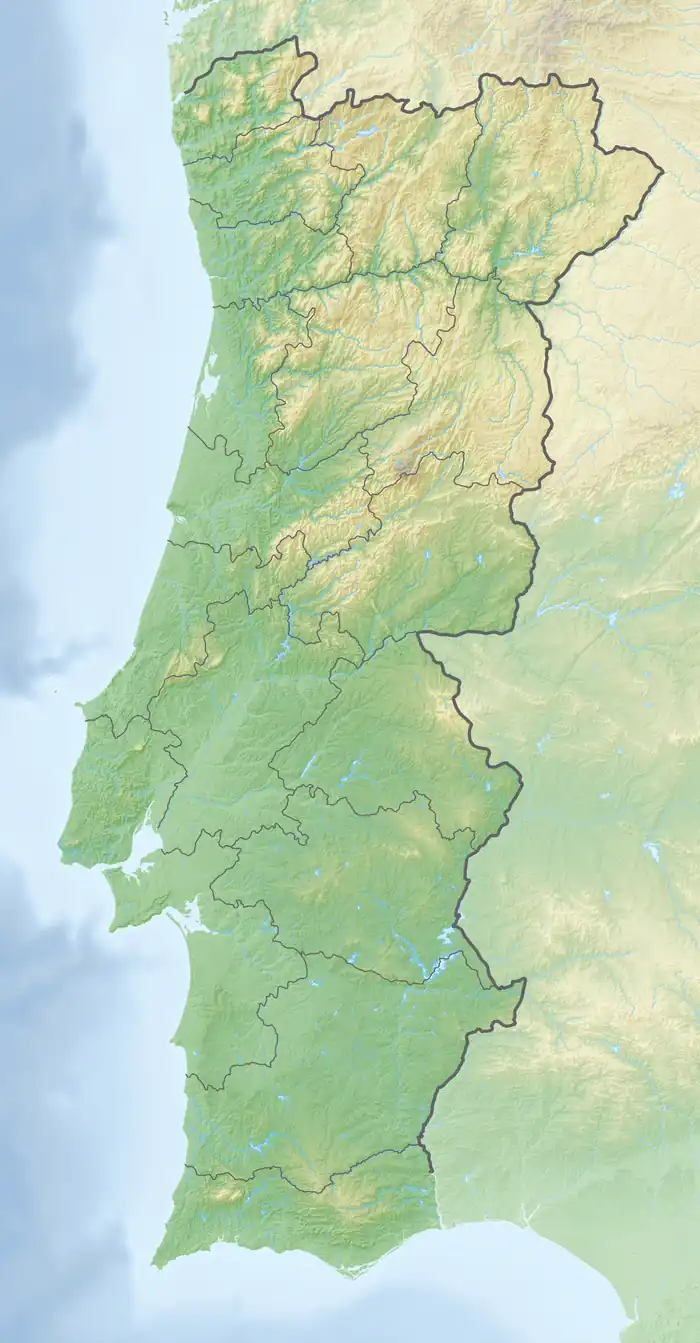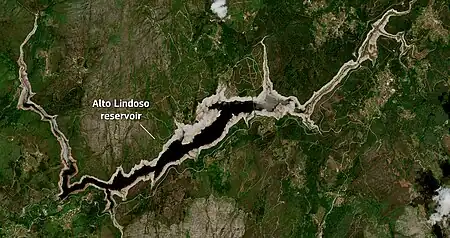Alto Lindoso Dam
Alto Lindoso Dam (Portuguese: Barragem do Alto Lindoso) is a concrete double curvature arch dam on the Lima River. It is located in the municipality Ponte da Barca, in Viana do Castelo District, Portugal. The dam lies in Peneda-Gerês National Park close to the border with Spain. The reservoir created by the dam is known as Alto Lindoso reservoir or Lindoso reservoir.
| Alto Lindoso Dam | |
|---|---|
 | |
 Location of Alto Lindoso Dam in Portugal | |
| Official name | Barragem do Alto Lindoso |
| Location | municipality Ponte da Barca, Viana do Castelo District, Portugal |
| Coordinates | 41°52′19.2″N 8°12′9″W |
| Purpose | Power |
| Status | Operational |
| Construction began | 1983 |
| Opening date | 1992 |
| Owner(s) | Companhia Portuguesa de Produção de Electricidade |
| Dam and spillways | |
| Type of dam | Concrete double curvature arch dam |
| Impounds | Lima |
| Height (foundation) | 110 m (360 ft) |
| Length | 297 m (974 ft) |
| Elevation at crest | 339 m (1,112 ft) |
| Width (crest) | 4 m (13 ft) |
| Width (base) | 21 m (69 ft) |
| Dam volume | 308,500 m3 (10,890,000 cu ft) |
| Spillway type | 2 shaft spillways |
| Spillway capacity | 2,760 m3 (97,000 cu ft) |
| Reservoir | |
| Total capacity | 379,010,000 m3 (307,270 acre⋅ft) |
| Active capacity | 347,910,000 m3 (282,060 acre⋅ft) |
| Surface area | 10.72 km2 (4.14 sq mi) |
| Normal elevation | 338 m (1,109 ft) |
| Operator(s) | Energias de Portugal |
| Commission date | 1992 |
| Type | Pumped-storage |
| Hydraulic head | 288 m (945 ft) (max) |
| Turbines | 2 x 317 MW Francis-type |
| Installed capacity | 630 MW |
| Annual generation | 933.8 GWh |
History
Construction of the dam began in 1983.[1] On 15 August 1991 the land behind the dam lying in Spain was compulsorily acquired by Portuguese company EDP (Electricidade de Portugal), based on an old deal between dictators General Franco of Spain and António de Oliveira Salazar of Portugal. Residents of the five villages which were going to be drowned by the dam, Aceredo, Buscalque, O Bao, A Reloeira and Lantemil, supported by left-leaning political parties, immediately began protests against the building of the dam,[2] including a ten-day hunger strike. In the end, with no option but to move, the residents of Aceredo (a town with 70 houses and 120 citizens) relocated bodies from their cemetery, and a historic church was moved to a different town. Some moved to nearby villages, others far away.[3]
The dam was completed in 1992 and drowned the five villages.[2] It is owned by Companhia Portuguesa de Produção de Electricidade (CPPE). The dam is used for power production.[1]
Dam
.jpg.webp)
Alto Lindoso Dam is 110 m (360 ft) tall (height above foundation) and 297 m (974 ft) long double curvature arch dam with a crest altitude of 339 m (1,112 ft).[1] The width at the base is 21 m (69 ft) (crest 4 m (13 ft)).[4] The volume of the dam is 308,500 m3 (10,890,000 cu ft). The dam contains two shaft spillways with three gates each (combined maximum discharge 2,760 m3 (97,000 cu ft)/s) and two bottom outlets (combined maximum discharge 400 m3 (14,000 cu ft)/s).[1]
Reservoir

At full reservoir level of 338 m (maximum flood level of 339 m) the reservoir of the dam has a surface area of 10.72 km²[4][5] and its total capacity is 379.01 million m³. Its active capacity is 347.91 (270)[6] million m³. Minimum operating level is 280 m.[1] With the 347.9 million m³ of water, 224.6 GWh of electricity can be produced.[7]
The formerly drowned village of Aceredo in 2022 emerged again after prolonged drought.[8][9]
Power plant
The pumped-storage[5] hydroelectric power plant went operational in 1992. It is owned by CPPE, but operated by EDP. The plant has a nameplate capacity of 630[1][5][7] (634)[6] MW. Its average annual generation is somewhat more than 900 GWh.[7][10][6][1][5]
The power station contains 2 Francis turbine-generators of 317 MW (350 MVA) each in an underground powerhouse 340 m below the surface.[4] The turbine rotates at 214.3 rpm. The minimum hydraulic head is 227 m, the maximum 288 m. Maximum flow per turbine is 125 m³/s.[7]
As lower reservoir for Alto Lindoso the reservoir of Touvedo dam is used,[5] which is connected via a tailrace tunnel with a length of 4,883 m.[4][10]
References
- "ALTO LINDOSO DAM". APA Barragens de Portugal. Retrieved 13 February 2015.
- Pontevedra, Silvia R. (14 December 2012). "Memoria de un pueblo ahogado". El País (in Spanish). Retrieved 21 February 2022.
- Johnson, Cara (15 February 2022). "After A Drought, This Decades-Old Spanish Ghost Village Has Reemerged From The Bottom Of A Reservoir". All That's Interesting. Retrieved 21 February 2022.
- "Central do Alto Lindoso" (in Portuguese). Museu da Electricidade. Archived from the original on 22 April 2015. Retrieved 13 February 2015.
- "Alto Lindoso Hydroelectric Power Plant Portugal". Global Energy Observatory. Retrieved 13 February 2015.
- "Hidroelectricidade em Portugal memória e desafio" (PDF) (in Portuguese). Rede Eléctrica Nacional, S.A. p. 30 (28). Archived from the original (PDF) on 27 June 2021. Retrieved 13 February 2015.
- "Alto Lindoso Informação Técnica" (in Portuguese). Energias de Portugal. Archived from the original on 5 November 2014. Retrieved 13 February 2015.
- "Week in pictures: 12–18 February 2022". BBC News. 19 February 2022. Retrieved 19 February 2022.
- "Ghost village emerges in Spain as drought empties reservoir". The Guardian. 12 February 2022. Retrieved 21 February 2022.
- "DECLARAÇÃO AMBIENTAL 2012" (PDF) (in Portuguese). Energias de Portugal. p. 16-17 (14-15). Archived from the original (PDF) on 3 November 2014. Retrieved 13 February 2015.